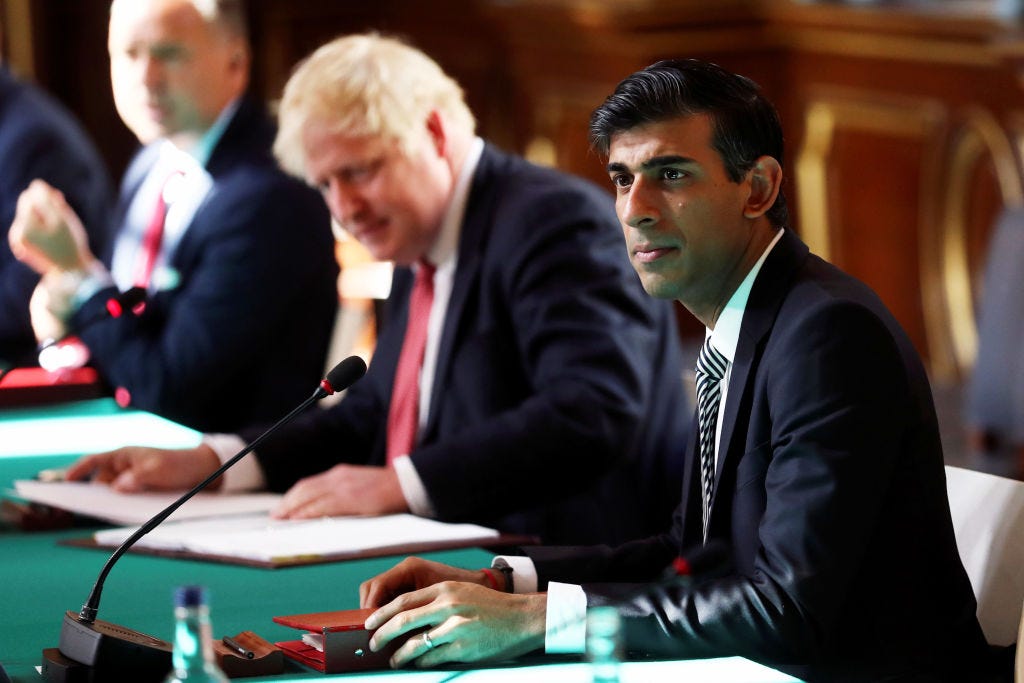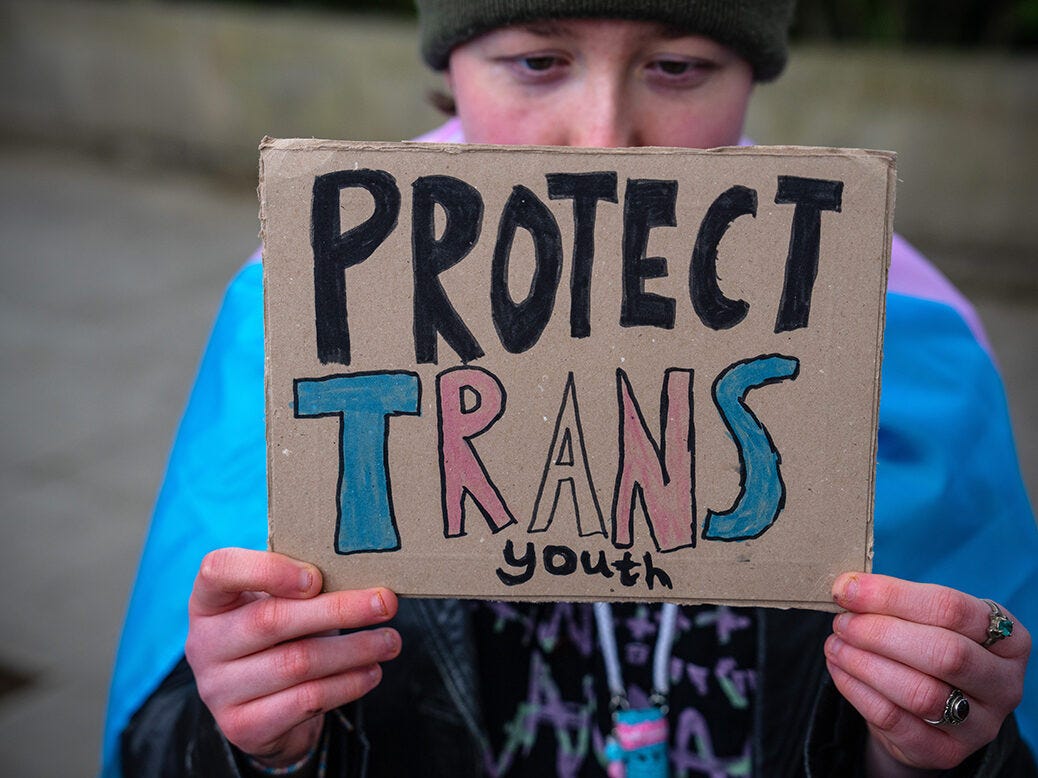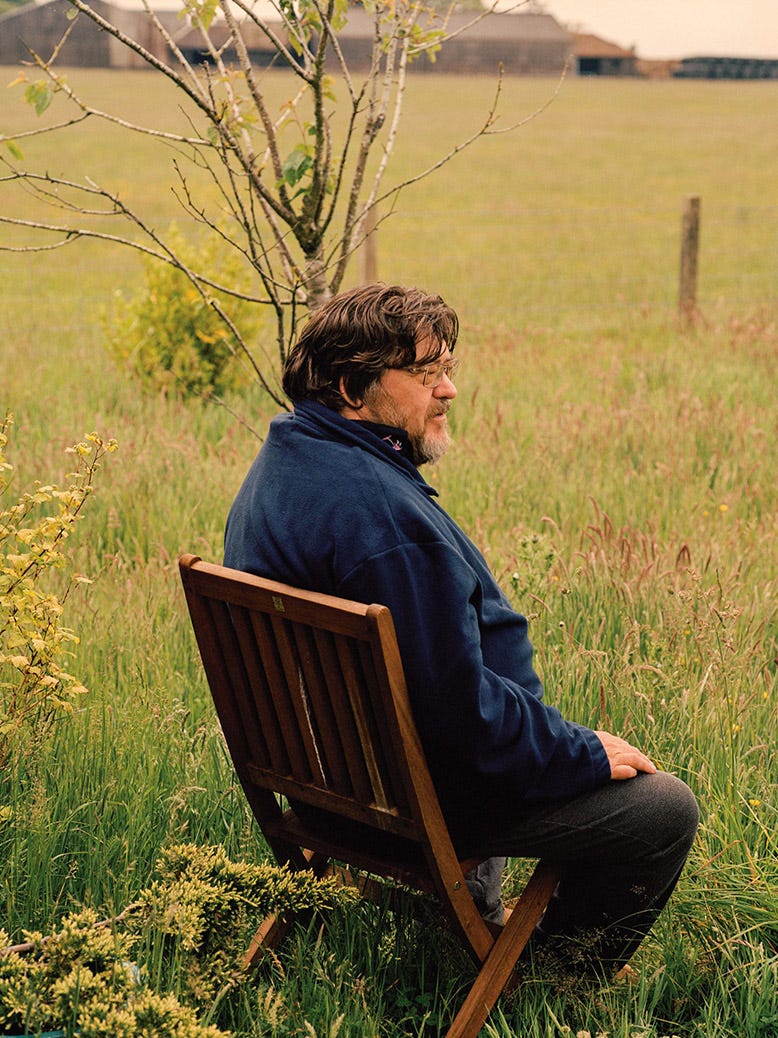The Saturday Read: #63
Inside: Labour's purge, Trump's felonies, Rafah, Woolf, Bridgerton, and the juice trade.
Good morning. Welcome to the Saturday Read, the New Statesman’s guide to politics, culture, books, and ideas. This is Harry, along with Jason, Pippa, George and Finn.
The long general election campaign is under way, and here at the New Statesman our Westminster team are already writing well about Labour divisions and Conservative decline and incompetence. On Wednesday we will publish the latest iteration of our Left Power List – there are some surprising risers and fallers from last year’s inaugural edition – and we have launched a daily politics podcast, chaired by our associate editor Hannah Barnes (Anoosh Chakelian is on maternity leave). Andrew will be writing a weekly essay in the magazine, and George Eaton, Rachel, Freddie, Finn and Will Dunn will bring you the latest news and analysis online, and here.
Last weekend, I wrote a piece of my own about Keir Starmer. What are his politics, I’m often asked. Is he a Blairite? A patriotic social democrat in the model of Clement Attlee, Labour’s great reforming leader who was a soldier at Gallipoli and later Winston Churchill’s deputy in the wartime coalition? A shrewd and ruthless tactician like Harold Wilson? The John Smith of our times?
The truth is he is all of these and none of them. He lacks a coherent politics and follows, as one former aide put it to me, “a kind of what-works pragmatism, taking each problem and issue as it comes along”. That Labour people struggle to find an appropriate label for Starmer and, therefore, to locate him in a tradition offers a clue to both his success and essential mystery, his ultimate unknowability.
The left loathe Starmer for his equivocations and supposed betrayals, and, in recent days, they have been especially enraged about the party’s ruthless approach to candidate selection and the harsh treatment of Diane Abbott and Faiza Shaheen (both of which we have covered below today). Labour should be a broad, heterodox coalition, not a narrow or uncompromising faction or sect. But for Starmer and his chief strategist, Morgan McSweeney, the “object of the exercise” is power, and the project, as Starmer told his biographer Tom Baldwin, is to return Labour “to the service of working people in working-class communities”.
What matters to them, as McSweeney would have it, is where the voters are, not Labour activists. Is this enough for now? The approach might bring them victory against Rishi Sunak’s demoralised Conservatives, but will the left one day return with a vengeance, inside and outside parliament? Their influence and relevance will, I guess, depend on the size of Labour’s winning majority: after all, first-past-the-post – I favour proportional representation – can create a kind of elective dictatorship.
To enjoy our latest election news and analysis with unlimited access to our coverage click here to subscribe to the New Statesman. You’ll enjoy all of the New Statesman online content, ad-free podcasts and invitations to NS events.
Poll of the week
Last week, 3,180 of you voiced your views on the prospect of an incoming Labour government. Ambivalence reigned in the aggregate, but opinions varied. This week:
1—“The infighting could be outweighed by the sense of Starmer’s zero-tolerance approach.”
The factional warfare gripping the Labour Party, writes Rachel Cunliffe, may not be as disastrous as many loud voices online seem to think. Faiza Shaheen’s tearful interview on Newsnight – after learning she had been deselected in Iain Duncan Smith’s north-east London seat of Chingford and Woodford Green – could even help Keir Starmer’s case. FM
You might argue – as plenty are – that none of this is grounds for deselection. But to undecided voters unsure if they can trust Labour, the message this decision sends is that Keir Starmer meant it when he said he would change his party. And the more noise the left makes about it, the more likely that message is to be heard. People across the country who have never heard of Faiza Shaheen and don’t care what happens in Chingford and Woodford Green are now aware of the row. The calculation is that the negative sentiment around party infighting will be outweighed, in the minds of key voters, by the sense that Starmer has a zero-tolerance approach.
On that note
We asked Andrew Marr, our political editor, to process the other deselection story roiling Labour this week – that of Diane Abbott – exclusively for Saturday Readers.
Diane Abbott has symbolised many things to many people over the years. And now she does again: Diane Abbott is the thus-far-and-no-further, high tide mark: she delineates the moment when surging self-confidence by the team around Keir Starmer becomes frothing and must retreat.
There had been a lot of internal anger before the Labour leader did the obvious and right thing and accepted that Abbott must be allowed to stand again. There clearly had been a cull of the Labour left going on, with grinning loyalists parachuted into seats at the last minute, in many cases to the anger and despair of local parties.
But none of this is surprising; or even necessarily wrong in principle. Starmer needs the best parliamentary party he can get for the rough years ahead. That means, up to a point, he needs people he already trusts and people with specific skills. A Starmerite party in power, with people like Torsten Bell, formerly of the Resolution Foundation, and Josh Simons, who ran Labour Together, among its MPs will be better equipped.
The price paid for that will be in some constituencies, where local party workers will simply not turn out, so angered are they by high-handed London impositions. There is particular anger, I’m told, in Durham where Luke Akehurst – a fixer from the right of the party – has been imposed. We may not notice any payback in the overall results on the election night but there is a cost to be borne later.
It is that the Parliamentary labour party will be, if less disputatious, also less questioning, less interesting, and less able through fraternal debate to warn of mistakes being made in government. You don’t want to go into power assured of factional warfare. You also don’t want to go into power atop an acquiescent grey blob.
I don’t particularly blame Starmer for behaving ruthlessly, even brutally. He has always been focused on winning. Yes he promised to end factionalism and increase party democracy and instead, to win bigger, he has acted factionally and ignored the democratic interests of local parties.
For that, many good Labour people will like him and trust him much less. But if he delivers a disciplined and effective government which starts to rebuild the shattered public realm, and improves the life chances of working people, I think they will forgive him. If.
The Diane Abbott case was always different and, for Starmer and his team, much more dangerous. It’s nothing to do with Corbyn or Corbynism. Because Abbott has been such a pioneering and iconic figure, her exclusion set alight a smouldering suspicion that black people were not quite as welcome in the Labour Party as they had believed. And that was a narrative so toxic that I’m told even some of the hardest nuts around Starmer realised it could not run for another day.
Now the tide must retreat. If people have been power drunk, they are sobering up. And that may not be the least of the services that Diane Abbott has rendered her party.
2—“Voters to whom the Tories appeal are a diminishing part of the electorate.”
The Conservatives, David Gauke tells us, are courting the pensioner vote. A confident party speaks to the median voter. The Tories have instead opted to focus on the narrow support of the baby boomers. This strategy is no secret. But Gauke observes something many haven’t: Brexit set it all in motion. FM
There is, surely, a form of centre-right politics that can appeal to better educated and younger voters. But the strategic decision taken by the Conservative Party after the Brexit referendum, particularly in 2019, was to commit itself to become the party almost exclusively of baby boomers with few educational qualifications. Given that choice, retreating from that strategy now risks short-term catastrophe, maintaining it ensures long-term oblivion.
3—“This conviction is a reminder of just how thoroughly Trump has degraded America.”
Donald Trump now holds the dubious title of the first former US president to be a convicted felon. Will it make any difference to the result of November’s election? Jill Filipovic thinks not. (Harry had more data on this in Morning Call yesterday.) PB
This moment is a relief for Americans who believe that, while our justice system is often imperfect, it is at its best when holding even the most powerful to the same standards as anyone else. Despite what Trump’s own team has argued, former presidents should not be immune from the rule of law. The prosecution put on a strong case, and a jury found that they demonstrated Trump’s guilt beyond a reasonable doubt. His status as a former president seeking to be a future one was not a get-out-of-jail-free card. This is precisely as it should be in a functional democratic state.
4—“Get up and walk through the city of death.”
Celeste Marcus searches Judaism’s deep tradition of mourning for a way to dignify the dead of Rafah. The massacres in Gaza have felt like a “role reversal”, and the hymns of loss now feel foreign. “What,” Marcus asks, “have we become?” GM
The day before I had bellowed in vain that human life is not cheap, that Rafah must be protected. I had already shrieked “Enough!”. Repeating it all again in less than 24 hours would simply have degraded the lives lost in the interim. Many friends repeated “I have no words left” in the face of another Israeli attack on Rafah. But words are precisely what we do have: Jews have the language to mourn. We are rich in granting dignity to the dead. I reached for our rituals, for a text with which I could pay proper respect to the burned bodies in the videos on my feeds.
5—“Evidence for puberty blockers to aid gender-related distress is flimsy.”
The Sunak government’s last piece of legislation before parliament was dissolved was a ban, until September, on private prescriptions of puberty blockers for under-18s. It will close loopholes until then, Hannah Barnes explains, but the responsibility for long-term legislation will fall to the next government. GM
The government argued the laws were necessary to “address risks to patient safety”. Before this intervention, private clinics could prescribe puberty blockers even though they are no longer available on the NHS in England (unless children are participating in a research trial). These emergency measures close that loophole. New prescriptions have been paused in Scotland, too.
The private markets are bouncing back: Governments are seeking to boost their economies via industrial strategy, expansionary fiscal policies, derisking, and by driving private capital into domestic industries in a way that reflects their strategic priorities – particularly around net zero.
A new study from State Street analyses how the next five years will be a key period for these markets after the recent macroeconomic challenges. Get the full report here.
6—“Woolf was consistently in love with freedom.”
Published between the wars, Virginia Woolf’s Three Guineas holds lessons for our conflict-ravaged world, writes Elif Shafak, who first encountered the essay while an aspiring writer living in Istanbul. Now, as in Woolf’s time, “a new literature is needed for a new world”. PB
Between 1914 and 1918, many civilians across the UK did not immediately grasp the extent of the suffering on the battlefield. It would take time for people to fully comprehend the gruesome reality of life in the trenches, the unseen scars and traumas inflicted by combat. A committed pacifist and antifascist, Woolf saw the invisible and could not unsee it. Her nephew had been killed in Spain, where he had volunteered to be an ambulance driver in the civil war. She had lost dear friends to conflict. She wanted everyone to understand the ravaging consequences of violence. More importantly, she wanted to dismantle the patriarchal structures that had perpetuated jingoism, militarism and war throughout history.
7—“Drugs were the only option I was offered.”
Around 8.6 million people in England – that’s more than one in seven – were prescribed antidepressants in 2022-2023, twice as many as in 2011. Rachel Kelly looks through a new report by an all-party parliamentary group, and calls for change. GM
I’m not alone in calling for change: the World Health Organisation and the United Nations are also arguing for systematic mental health reform, again emphasising the importance of psychological and social support, and corrections to address the rise in prescriptions. I can never know for sure whether this kind of approach would have saved me from years of relying on medication. But I am certain it would have helped me – and could help millions of others.
8—“Bridgerton is Jane Austen with the sex put back in.”
The hit Netflix show is a conservative fantasy, old-fashioned, patriarchal and gilded. Still, Tanya Gold found something to love in it: the power of journalism. Miss Penelope Featherington (Nicola Coughlan), a gossip columnist known as Lady Whistledown, is “a typical female writer… shy, overweight, awkward”, and the series’ sole feminist hero. PB
Bridgerton loves class: if you didn’t why would you bother to write eight whole books about it? Even so, Americans – and Quinn and Rhimes are both American, though minorities, which might explain their obsession with class – don’t have to live with it. They think it is decorative, like the Cotswolds: a leisure choice, or theme. A function of the class system is that you can’t see beyond it. But others who should know better join in. I had this encounter on the set of Downton Abbey (it’s not really an abbey, it’s a house): the PR told me she loved the class system. She should be in Bridgerton. Perhaps in her mind she is.
Freshly squeezed supply chains
I was troubled to read in the Financial Times this week of the crisis that has beset the orange juice market. Pestilence and unpredictable weather in Brazil have thrown supply chains into disarray. Orange juice futures (traded on Intercontinental Exchange in New York) have soared to £4.92 a pound this week – double what they were last year. Juice drinkers will feel the pain.
I am reminded of the equally concerning Great Mustard Shortage of 2022, when a Canadian drought and the war in Ukraine was to blame. Now the orange juice industry is about to undergo a fundamental restructuring, as producers turn to the less volatile mandarin crop. Japan – usually reliant on Brazil – has taken the leap of faith. 7-Eleven, the FT reports, has already launched an orange-mandarin blend to plug the supply gap.
“But mandarins taste nothing like oranges!” I hear you say. Adapting to a warming planet will require our tastes to change. Take vines: another plant terribly sensitive to weather. Hotter summers are producing barrels of higher-alcohol and lower-acidity wine. And now we face the inexorable march to mandarin juice dominance. “This is a crisis,” Kees Cools – President of the International Fruit and Vegetable Juice Association – told the FT. A crisis indeed.
George’s Best of the Rest
Sky: Donald Trump found guilty of all 34 hush-money charges.
Guardian: Pope Francis allegedly uses homosexual slur.
FT: Evening Standard goes weekly. Wi-Fi on the Tube was bad enough as it is.
Simon Jenkins: Lament for the Standard.
William Atkins and Tereza Červeňová: The last freeminers of England.
Gary Saul Morson: On The Gulag Archipelago at 50.
Sam Fentress: The genius of Ella Fitzgerald.
William Deresiewicz: Deep reading will save your soul.
Wayne Rooney plays golf with Trump. Somehow it’s so right.
McDonald’s distances itself from $18 Big Mac. I should think so!
John Burnside, 1955-2024
John Burnside, the acclaimed Scottish poet, novelist and memoirist, has died aged 69. In 2011, the year that he won both the TS Eliot Prize and the Forward Poetry Prize for his collection Black Cat Bone, he began writing a regular nature column for the New Statesman – alongside poems, reviews and occasional essays.
Whether describing the plight of the Sami people in Norway or reflecting on his encounters with wildlife in his native Fife, John’s writing was lyrical, finely observed, deeply compassionate and often stridently political in his arguments for the value of the natural world. Here are some of our favourite pieces by John Burnside.
If today’s pieces intrigued, you can subscribe to the New Statesman below. Stay up to date with everything from news and analysis to comment, criticism and essays.
Whether you’re looking for a sharp blog or a finely written feature, the New Statesman has you covered. Have a good week, and catch you next Saturday.
























Give the guy a break. He has raised this lot from the ashes of Corbyn, Abbott and co. which was a huge task of itself. No doubt that the looney left will try to get back and ride on the success so far and the same old frictions and in fighting will offer the prize on a plate back to the tories. What goes around comes around.
Des Grimble
All four of them are admirable and I look forward to them being ministers in the Labour administration. Rachel has been a constant inspiration on the economic front for years. I was 26 when Harold Wilson won in 1964 and it seems a lifetime ago. I look forward to a successful Labour government and hope it manages to resolve the many issues facing it, especially the cost of living, housing, NHS waiting lists, immigration and processing of asylum applications, etc, etc.